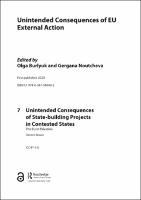Chapter 7 Unintended Consequences of State-building Projects in Contested States
Proposal review
The EU in Palestine
| dc.contributor.author | Bouris, Dimitris | |
| dc.date.accessioned | 2019-11-12 13:30:47 | |
| dc.date.accessioned | 2020-04-01T09:30:24Z | |
| dc.date.available | 2020-04-01T09:30:24Z | |
| dc.date.issued | 2019 | |
| dc.identifier | 1006303 | |
| dc.identifier | OCN: 1135845050 | en_US |
| dc.identifier.uri | http://library.oapen.org/handle/20.500.12657/23835 | |
| dc.description.abstract | The existing literature on state-building has focused mainly on post-conflict cases and ‘conventional’ examples of statehood, without taking into consideration the particularities of states that remain internally and/or externally contested. The EU’s engagement in Palestinian state-building through the deployment of EUPOL COPPS and EUBAM Rafah has generated various types of unintended consequences: anticipated and unanticipated, positive and negative, desirable and undesirable, some of which fulfill and some of which frustrate the initial intention. These have important reverberations for the EU’s conflict resolution strategies in Israel and Palestine, the most important being the strengthening of power imbalances and the enforcement of the status quo. | |
| dc.language | English | |
| dc.subject.classification | thema EDItEUR::J Society and Social Sciences::JP Politics and government | en_US |
| dc.subject.other | State-building | |
| dc.subject.other | contested statehood | |
| dc.subject.other | unintended consequences | |
| dc.subject.other | EUPOL COPPS | |
| dc.subject.other | EUBAM Rafah | |
| dc.subject.other | EU, Palestine | |
| dc.title | Chapter 7 Unintended Consequences of State-building Projects in Contested States | |
| dc.title.alternative | The EU in Palestine | |
| dc.type | chapter | |
| oapen.relation.isPublishedBy | 7b3c7b10-5b1e-40b3-860e-c6dd5197f0bb | |
| oapen.relation.isPartOfBook | 89161ded-2ea5-48b5-958a-bb03954059a1 | |
| oapen.imprint | Routledge | |
| oapen.pages | 17 | |
| oapen.remark.public | 3-8-2020 - No DOI registered in CrossRef for ISBN 9780367346492 | |
| oapen.identifier.ocn | 1135845050 | |
| peerreview.anonymity | Single-anonymised | |
| peerreview.id | bc80075c-96cc-4740-a9f3-a234bc2598f1 | |
| peerreview.open.review | No | |
| peerreview.publish.responsibility | Publisher | |
| peerreview.review.stage | Pre-publication | |
| peerreview.review.type | Proposal | |
| peerreview.reviewer.type | Internal editor | |
| peerreview.reviewer.type | External peer reviewer | |
| peerreview.title | Proposal review | |
| oapen.review.comments | Taylor & Francis open access titles are reviewed as a minimum at proposal stage by at least two external peer reviewers and an internal editor (additional reviews may be sought and additional content reviewed as required). |

